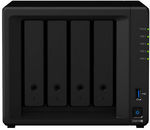Hi guys,
First time posting so let me know if there's anything I need to change.
I've been watching this NAS for some time so I can sell my current set up and get something that is better for longevity.
Not the cheapest this year, but definitely a good bargain compared to some that are currently on.
Hope this helps!





Looks good, I am a small business who creates media for other businesses. Would this be a recommended NAS system? I currently have the 3, 2, 1 system (3 x copies, 2 x different types, 1 off-site). However, I'm currently buying hard drive after hard drive and storing them away. I see it has slots for two SSD's which is handy, 4 standard slots, 56 TB (126 TB expansion). Are there any downsides to this unit?
What storage is recommended to go into these?
Thank you in advance!